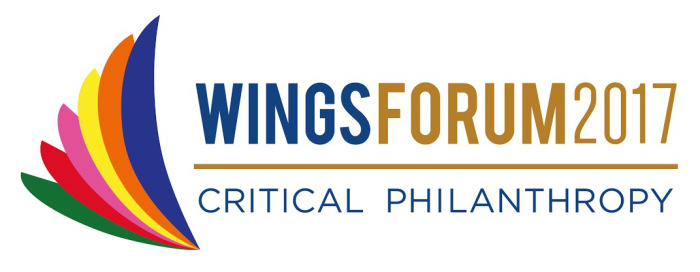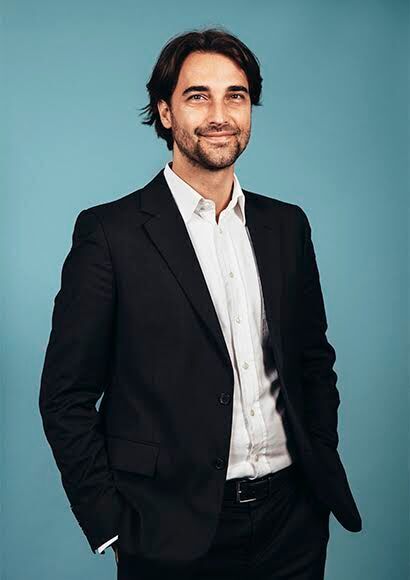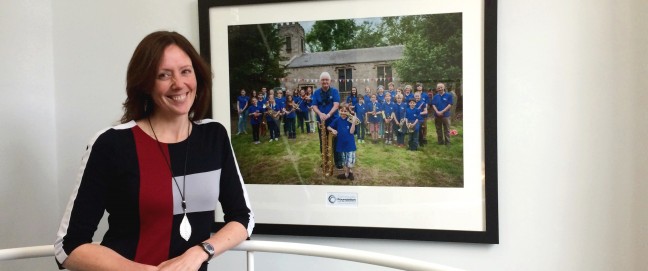Benjamin Bellegy, the new CEO of philanthropy infrastructure organization WINGS, is a French national living in Brazil. This is emblematic of the breadth of experience he brings to the role. Working previously for NGOs and cooperation agencies in Africa and the Fondation de France, he has seen philanthropy infrastructure as both consumer and provider. This dual perspective has given him a particular view of the importance of infrastructure organizations. He talks to Alliance editor Charles Keidan about his priorities for WINGS and, specifically, what the upcoming WINGS Forum in Mexico City will bring.
How did you become involved in philanthropy?
What made me start working in this field was not a will to help bring wealth to the ‘poor’ but an interest in learning from the wealth of the so-called poor. It started with my fascination for one country, Ethiopia, where I decided to go after my studies because of its incredibly rich history, culture, geography and people. While I was there, I started to work in the NGO sector because I wanted to be actively involved in this society and learn from it.
Since then, I have continued working in different ways to achieve positive change in societies, a change that is rooted in respect for diversity, for local resources and heritage, and in equal partnership. In my life and my work, I give as much value to the intangible as to the tangible. This makes a lot of sense at WINGS. It’s a global network that supports philanthropic plurality, cultures of giving, and promotes the intangible – and nonetheless invaluable – contribution of philanthropy infrastructure to development and social change worldwide.
In 2012, I returned to France and started working in the philanthropy sector, for the Fondation de France, in charge of international programmes. In this position I spent a lot of my time working with other foundations and with infrastructure organizations like the Network of European Foundations and the European Foundation Centre, because I believe in the value of collaboration and synergies in the philanthropic field.
The organizations that serve philanthropy can seem a long way from the ground. Their concrete impact on people and societies is often intangible and, thus, overlooked. But if you look closer, their contribution is obvious…
I also supported the development of local philanthropy in Haïti as part of a post-earthquake exit strategy. As a funder I discovered how strategic and crucial the development of a local infrastructure is to creating sustainable and locally rooted development.
Why is philanthropy infrastructure important?
The organizations that serve philanthropy can seem a long way from the ground. Their concrete impact on people and societies is often intangible and, thus, overlooked. But if you look closer, their contribution is obvious: by connecting foundations they avoid duplication, they foster synergies and they allow innovative approaches to scale. They play a very large part in improving the legal framework and regulations, such as tax incentives, that allow philanthropy to develop.
As chair of the Fikra fund for Tunisia, and JAFOWA, a joint fund for African farmer organizations, I have seen the value of working together, pooling financial and non-financial capital. I am convinced, and want to convince others, that a strong philanthropy infrastructure is part of the means to address the huge challenges of the sustainable development agenda.
WINGS’ role is to advocate for infrastructure organizations and show, case by case, report by report, how much impact the sector has. It is also our role to maximize the field’s own efficiency by making the connections, improving transparency, aggregating data and sharing best practice.
My vision for WINGS is to become a facilitator of change and a means of strengthening philanthropy infrastructure across the globe. This means being increasingly active and effective in disseminating relevant tools and innovations. It also means we have to be particularly supportive in regions where institutional philanthropy is newer and still developing.
Finally, in the increasingly challenging context in which civil society and philanthropy work, we have a responsibility to help our members work and advocate for philanthropy at a global level, with other sectors and with colleagues from civil society organizations and platforms.
My vision for WINGS is to become a facilitator of change and a means of strengthening philanthropy infrastructure across the globe.
You’ve moved from Fondation de France, a national umbrella body, to WINGS, a meta-umbrella body, and from France to Brazil. How have you found those transitions?
They are both very exciting. I’ve moved between the north and south before – I’ve lived and worked in different parts of the world before, so I already had a global mindset, but it’s very exciting and interesting to work for a global organization that has its headquarters in the global South. I think it makes a lot of sense. Moving from a national umbrella organization to a global network is a very important change.
My previous experience allows me to understand what our members and our members’ members, namely foundations and philanthropists, are expecting. I know philanthropic infrastructure both from a user’s and from a provider’s perspective. I see the potential of WINGS not only in building knowledge and global data, but also in concretely contributing to philanthropy development.
It is necessary to improve their efficiency but also to document their impact and value and we are developing a framework in partnership with DAFNE to help them do that. It’s called the 4Cs – capacity, capability, credibility and connection…
At the moment, WINGS supports its members through advocacy, affinity groups, data, cross-sector partnerships – how important are each of those?
All of those are important and we will continue working on them. One of the important things for the future will be working on the evaluation of infrastructure organizations. It is necessary to improve their efficiency but also to document their impact and value and we are developing a framework in partnership with DAFNE to help them do that. It’s called the ‘4Cs’ – capacity, capability, credibility and connection – and it looks at four types of impact: building resources; building skills, knowledge and expertise; building relationships; building reputation, recognition and influence. These are the different dimensions philanthropy infrastructure’s value and it’s through them that we want to support our members.
Can you say more about your advocacy work and affinity groups?
Advocacy for an enabling environment is an important area we have to develop. Our new report shows that philanthropy infrastructure is increasingly engaged in this field, with almost two-thirds of our members involved in it. We organized an international meeting in Lisbon in March 2016 and disseminated a roadmap based on our members and partners’ recommendations. There will also be a pre-conference workshop at WINGSForum to identify next steps and engage our network.
I think WINGS can help to catalyse and share information about who is doing what, help avoid duplication, foster synergies and make information easily available to the network. And when we talk about an enabling environment and advocacy, it is really crucial that as a network, we work more and more in collaboration with other sectors. We need to be creative in building alliances.
We also need to develop our affinity groups. Everything that WINGS does is done not only for the network, but with the network. This creates, de facto, affinity groups even when they are not formalized. The 4Cs evaluation framework, for instance, has been developed in the past months by a group of members who are particularly interested in evaluation.
For the future, we will offer opportunities to our members who want to be actively engaged in a more sustainable and structured way around common interests: creating an enabling environment for philanthropy could be a good example. We have already invited academic institutions to join our network and have invited them to discuss their future engagement and possibly, the creation of a specific affinity group, at WINGSForum.
One of the challenges for many types of infrastructure organizations is who should pay for it. What’s your view?
That’s a very important question. The name infrastructure conveys an image of something that is very tangible and visible, whereas the infrastructure we are talking about here is mostly intangible, so its value is often underestimated. Primarily, it is funders themselves who support their infrastructure, because they are the ones who directly benefit from the services that are provided by the sector.
In places where infrastructure is highly developed, that’s well understood, but there is a real need to sensitize philanthropists in the areas where infrastructure is newer on the importance of their supporting its creation and development. In a country like India, where the volume of institutional philanthropy is very important and quickly growing, there is not yet a national association of foundations, for instance. Local resources for a strong local philanthropic ecosystem is what we hope to see happening in the next decade.
But even where infrastructure is more developed, most organizations are struggling for their sustainability. Philanthropists understandably want to focus on delivering concrete projects for communities and it requires time, dialogue and understanding to see the importance of also building a whole ecosystem of philanthropy support organizations.
In places where infrastructure is highly developed, that’s well understood, but there is a real need to sensitize philanthropists in the areas where infrastructure is newer on the importance of their supporting its creation and development.
Which foundations do the best at supporting infrastructure?
Despite challenges, there are funders of infrastructure whose crucial support is not always as visible and acknowledged as it should be. However, even many of these philanthropy infrastructure funders don’t necessarily consider their support as a strategic investment, but rather as a general ‘good citizen’ contribution to the field. Foundations that have more history in supporting infrastructure organizations are logically those who have included it more strategically in their programmes. Some foundations like the Charles Stewart Mott Foundation have developed a very strong and articulated approach.
We also had some surprises while we were researching infrastructure funders in our latest report. We found some foundations from the Global South were investing significant amounts, up to 60 per cent of their budget in one case, in philanthropy infrastructure. In comparison, a recent letter published in the Chronicle of Philanthropy recently called on foundations in the US to invest at least one per cent of their budget in infrastructure.
We are inviting funders of infrastructure from all over the world to meet at the WINGSForum, to discuss their motivations and approaches, and to see if there is room for collaboration among them. We hope it might contribute to raising funder awareness and to making this kind of support more strategic.
You have mentioned the upcoming WINGS Forum. What aspect of it are you most excited about?
I think the title ‘Addressing complexity, challenging ourselves’ is very much in line with the huge challenges that lie ahead, and it’s a way for us to call the sector to face those challenges, which may mean reinventing itself and its approach in order to increasingly address the root causes.
 The Forum happens only once every three years and it is the only moment when all the infrastructure organizations from across the globe have the opportunity to meet, work together and engage in discussion with other actors. That’s very important because most of the time, these organizations have little opportunity to exchange with their peers.
The Forum happens only once every three years and it is the only moment when all the infrastructure organizations from across the globe have the opportunity to meet, work together and engage in discussion with other actors. That’s very important because most of the time, these organizations have little opportunity to exchange with their peers.
For me, it’s a fantastic opportunity to meet our members and get to know their realities and their work. It’s also the moment where we are going to launch the most important activities of WINGS: I mentioned the enabling environment meeting, the 4Cs framework, the new global infrastructure report. We have great speakers from various regions and we’re really looking forward to welcoming as many philanthropy and social investment leaders as possible to Mexico City with our co-hosts, CEMEFI.
The other part of the Forum’s billing is ‘critical philanthropy: addressing complexity and challenging ourselves’. When you talk about ‘critical philanthropy’ do you mean philanthropy is critical to addressing and solving social problems or are you saying that we need to be critical of philanthropy in order to improve it? Or both?
Both. The second part of the title illustrates the two meanings. First, philanthropy has to face critical global issues and we need to explore what infrastructure organizations can do to help philanthropy adapt and address them. And, second, we need to look inwards, be critical of ourselves, see how we can improve our work, look at contradictions within the philanthropic sector and try to find where the synergies are and where the potential lies.
In addition, the way the philanthropic sector is covered by the media in general is sometimes simplistic, even a bit of a caricature, so it would be interesting to explore how the specialized philanthropy media could help to change and enrich the perspective on philanthropy of the mainstream media.
WINGS’ name highlights support for grantmaking, but grantmaking is only one aspect of philanthropy. Do you sometimes feel there is an excessive Anglo-Saxon focus in your name, even if your operations are not Anglo-Saxon at all?
I agree that the reality of our work goes much beyond grantmaking. Grantmaking is a very valuable way to work in philanthropy and has to be supported, but it’s definitely not the only one, so, yes, our name does not cover the whole range of what we and our members are doing and maybe we will consider revising it one day, though it’s not a priority for now.
One final question: do you see philanthropy media as an important part of philanthropy infrastructure?
Definitely. They contribute greatly to building knowledge, disseminating practices and facilitating connections. In addition, the way the philanthropic sector is covered by the media in general is sometimes simplistic, even a bit of a caricature, so it would be interesting to explore how the specialized philanthropy media could help to change and enrich the perspective on philanthropy of the mainstream media. They are a crucial part of the infrastructure.
Benjamin Bellegy is the new CEO of WINGS.












Comments (0)